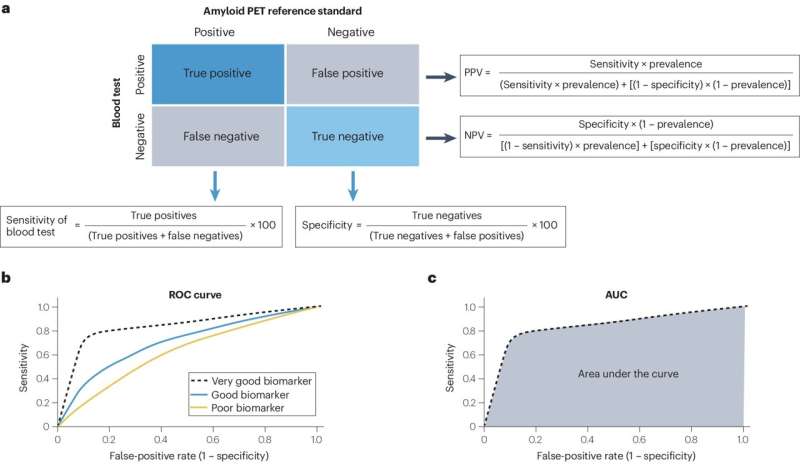This article has been reviewed according to Science X's editorial process and policies. Editors have highlighted the following attributes while ensuring the content's credibility:
fact-checked
peer-reviewed publication
trusted source
proofread
Accuracy of diagnostic blood tests for Alzheimer's disease varies

Neurologists diagnose cognitive impairment with a clinical exam of memory and thinking skills. To determine whether Alzheimer's disease is the cause of the cognitive impairment, evidence of the specific brain changes that characterize Alzheimer's must be obtained, typically via a brain scan or spinal tap. Identifying people whose cognitive symptoms are due to Alzheimer's disease is critical now that new Alzheimer's therapies are available that could change the course of the illness.
To make diagnosis more convenient for patients, many companies have begun selling Alzheimer's blood tests to consumers, and at least five companies are now offering these tests to doctors for clinical use. Doctors have no way of knowing which tests are most accurate, because until now, the tests have not been evaluated in a head-to-head comparison using the same population, methods and criteria.
Suzanne Schindler, MD, Ph.D., and her team at Washington University School of Medicine in St. Louis led a data analysis comparing the accuracy of six commercial blood tests, four of which are clinically available, in detecting signs of Alzheimer's disease, particularly the presence of the characteristic amyloid plaques in the brain. The analysis showed that some of the tests are accurate enough to replace spinal taps and brain scans in many patients with cognitive impairment. The results are being presented today, July 30, in an oral session at the Alzheimer's Association International Conference in Philadelphia.
"Some of the blood tests are accurate and some are not, and doctors don't know which tests to use," said Schindler, an associate professor of neurology at Washington University and the lead author of the study. "With this head-to-head comparison, doctors now have more reliable information about which tests will best help them provide an accurate diagnosis to their patients."
Confirming that cognitive impairment is due to Alzheimer's disease—early in the course of the illness—is crucial for ensuring access to the newest generation of Alzheimer's therapies. In the past two years, the Food and Drug Administration (FDA) has approved two drugs that slow the trajectory of disease, with more in the pipeline. Both FDA-approved drugs target amyloid, so doctors must confirm that a patient has amyloid buildup in the brain before they can prescribe the treatment. In addition, the diagnosis must be confirmed as early in the disease course as possible, because the drugs are only approved for people with very mild to mild symptoms.
The team evaluated the ability of six commercially available blood tests to detect proteins in the blood that correlated with key features of Alzheimer's disease: amyloid plaques and tangles of the protein tau in the brain, reduced brain volumes and cognitive impairment. The six tests were developed by ALZpath, C2N Diagnostics, Fujirebio Diagnostics, Janssen, Quanterix and Roche Diagnostics. C2N Diagnostics is a Washington University startup, and its Alzheimer's tests are based on technology licensed to C2N by the university.
Blood samples and participant data were obtained from the Alzheimer's Disease Neuroimaging Initiative (ADNI), a long-running, multisite collaboration designed to identify Alzheimer's biomarkers and to advance biomarker development by sharing data and resources within the research community. The study included 392 people who had provided blood samples within six months of undergoing brain scans. The participants had a median age of 78.1 years, and just under half (49%) exhibited cognitive impairment.
Each of the six tests measured the blood levels of one or more biomarkers linked to Alzheimer's disease. Across the six tests, five distinct biomarkers were measured using various techniques. One biomarker, used in four of the tests, proved exceptionally accurate at identifying signs of Alzheimer's disease: a form of tau known as phosphorylated tau 217 (p-tau217).
"Some people thought that we might need to measure multiple biomarkers to get at the different features of Alzheimer's disease," said Kellen Petersen, Ph.D., an instructor in neurology at the School of Medicine. Petersen co-led data analysis for the study and will give the oral presentation at the international Alzheimer's conference. "That's not what we found. P-tau217 alone can do it all. It accurately predicted levels of amyloid and tau in the brain, brain volumes and cognitive symptoms. It was more accurate than any other biomarker, or even any combination of biomarkers, across the board."
The four tests that incorporate measures of p-tau217 all performed well, regardless of the approach they took to measuring the protein. The top two performers across all measures were C2N Diagnostics' PrecivityAD2 and Fujirebio's Lumipulse.
In June, the Global CEO Initiative on Alzheimer's Disease published a paper in Nature Reviews Neurology laying out a framework for using blood tests in Alzheimer's clinical care and recommending minimum criteria for acceptable performance. Schindler is the lead author on that paper.
"We concluded that to be used without a second test, blood tests need to be as accurate as FDA-approved cerebrospinal fluid tests, which are approximately 90% sensitive and specific at identifying Alzheimer's disease in cognitive impaired individuals," Schindler said. "In this current study, the p-tau217 tests met that standard, but the others did not."
More information: Suzanne E. Schindler et al, Acceptable performance of blood biomarker tests of amyloid pathology — recommendations from the Global CEO Initiative on Alzheimer's Disease, Nature Reviews Neurology (2024). DOI: 10.1038/s41582-024-00977-5



















